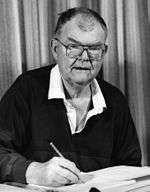Olin J. Eggen
| Olin Eggen | |
|---|---|
 | |
| Born |
July 9, 1919 Rock County, Wisconsin |
| Died |
October 2, 1998 (aged 79) Canberra, Australia |
| Residence | La Serena, Chile |
| Nationality |
|
| Alma mater | University of Wisconsin–Madison |
Olin Jeuck Eggen (July 9, 1919 – October 2, 1998) was an American astronomer.
Biography
Olin Jeuck Eggen was born to Olin Eggen and Bertha Clare Jeuck in the village of Orfordville in Rock County, Wisconsin. Both of his parents were of Norwegian extraction. He graduated from the University of Wisconsin–Madison in 1940. After serving in World War II in the OSS, he returned to the university and received his Ph.D. in astrophysics in 1948.
He became known as one of the best observational astronomers of his time. He is best known for a seminal 1962 paper with Donald Lynden-Bell and Allan Sandage which suggested for the first time that the Milky Way Galaxy had collapsed out of a gas cloud. He first introduced the now-accepted notion of moving groups of stars. He won the Henry Norris Russell Lectureship in 1985.
Over that time he held positions at Lick Observatory (1948–1956), Royal Greenwich Observatory (1956–1961), California Institute of Technology, Mt. Wilson Observatory (1961–1966), Mount Stromlo Observatory, Australian National Observatory (1966–1977), and at Cerro Tololo Inter-American Observatory (1977–1998).
Eggen's professional memberships and honors include the American Astronomical Society's Russell Lectureship (1985), membership in the Royal Astronomical Society (vice president 1961-1962), Pawsey Memorial Lectureship of the Australian Institute of Physics, member of the Australians Society of Astronomers (president 1971-1972), and member of the Astronomical Society of the Pacific.
After his death he was found to have been in possession of highly significant historical files and documents that had apparently gone missing for decades from the Royal Greenwich Observatory, including the "Neptune file".[1] During his lifetime he had always denied having taken the papers or having them in his possession.
The University of Wisconsin-Madison retains a collection Eggen's personal papers and correspondence. This collection includes material about the large scale developments in post-war astronomy and astrophysics, especially the creation of large (4 meter) optical telescopes in the southern hemisphere. The Eggen Archive are held in the Steenbock Library at University of Wisconsin–Madison Archives.[2][3]
Olin J Eggen Scholarship
The Olin J Eggen Scholarship was established in 2000 to commemorate the contributions of the late Professor Eggen. The endowment supports a scholarship for international students seeking to pursue PhD research at the Research School of Astronomy and Astrophysics at the Australian National University.[4]
Selected works
- Three-colour photometry of 4000 northern stars (1968)
- Contact binaries, II (1967)
- Colours, luminosities and motions of the nearer giants of types K and M (1966)
- The empirical mass-luminosity relation (1963)
- Space-velocity vectors for 3483 stars with accurately determined proper motion and radial velocity ( 1962)
- Three-colour photometry in the southern hemisphere: NGC 6383, NGC 6405 and standard stars (1961)
- Three-colour photometry of red variables (1961)
References
- ↑ Kollerstrom, Nick (2001). "Neptune's Discovery. The British Case for Co-Prediction.". University College London. Archived from the original on 2005-11-11. Retrieved 2007-03-19.
- ↑ Olin J. Eggen and the Eggen Archives (Board of Regents of the University of Wisconsin System)
- ↑ Olin J. Eggen papers (International Catalog of Sources)
- ↑ Olin J Eggen Scholarship (Australian National University College of Physical Sciences)
External links
- "A Remembrance of Olin Eggen — 1919–1998", by Nicholas B. Suntzeff, 6 October 1998; NOAO Newsletter, No. 56, December 1998.
- "Eggen Takes the Papers" at the Wayback Machine (archived February 6, 2005), by Nick Kollerstrom, Neptune's Discovery: The British Case for Co-Prediction, Science and Technology Studies, University College London.
- "The Case of the Pilfered Planet", by William Sheehan, Nicholas Kollerstrom, and Craig B. Waff, Scientific American.com, December 2004.